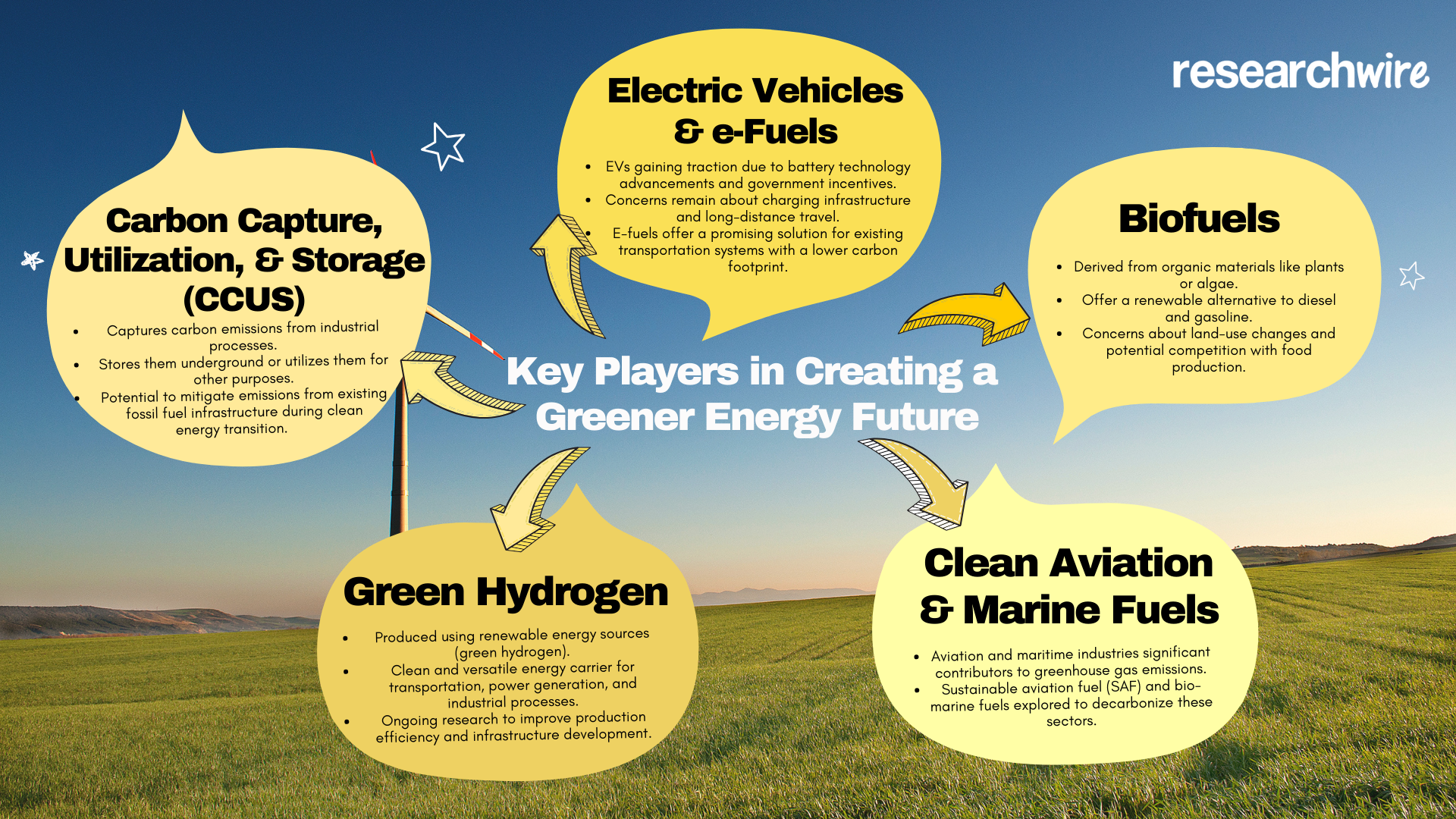Rohit Kumar is responsible for Researchwire European & North American business. He is an HEC, Paris 2008 MBA and Indian Institute of Technology (IIT) Kharagpur 2002 engineering graduate with close to 17 years of experience in business innovation and strategy, business development and client relationship roles. He is working with ResearchWire since 2016 and as a partner, is responsible for the growth of ResearchWire in Europe and North America.
Prior to ResearchWire, Rohit was handling sales strategy and pricing for Syniverse Technologies, a telecom services provider, where he was instrumental for growth in EMEA and India through product innovations, creative pricing and discounting models and executing strategic sales plans.
Rohit is based out of Luxembourg and has been living in Europe for last 12 years. He understands European & North American customers and their needs and ensures that our customers always have a local person to reach out whenever needed.
The world’s energy sector is facing a perfect storm. Soaring fuel prices, driven by geopolitical tensions and post-pandemic ripples, are wreaking havoc on economies worldwide. This volatility exposes a critical vulnerability: dependence on a select few resource-rich nations. The answer lies not just in weathering the storm, but in charting a new course towards energy independence. Clean energy emerges as the most potent weapon in this fight, promising not just economic resilience but also a path towards a sustainable future.
This blog delves into the transformative potential of clean energy. We’ll explore how embracing clean alternatives can empower nations to break free from the shackles of volatile fuel markets, fostering economic growth, job creation, and a greener tomorrow.
The Geopolitical Ripple Effect: How Fuel Prices Reshape the Economic Landscape
The global economy is still reeling from the twin crises of the pandemic and the recent surge in fuel prices. This volatility, particularly in the traditional fossil fuel market, has exposed the vulnerability of countries reliant on a few resource-rich nations. The resulting economic uncertainty has ignited a fire under alternative fuel research and development, propelling clean energy solutions to the forefront.
Clean energy technologies not only offer a solution to mitigate the risks of climate change but also present opportunities for job creation and economic growth. However, innovation in the clean energy sector relies heavily on robust patent and intellectual property rights protection. These legal frameworks incentivize investment in research and development, fostering a conducive environment for technological breakthroughs.
Beyond the Pump: The Ripple Effect of Fuel Prices
Fuel prices have a domino effect throughout an economy. A study by the International Monetary Fund suggests that a 10% oil price rise would dampen global output about 0.2% next year. This translates to dampened consumer spending, increased transportation costs, and potential inflationary pressures.
Steering Towards a Sustainable Future: Alternative Fuels Take Centre Stage

In response to this economic and environmental challenge, the world is witnessing a surge in research and development focused on alternative fuels. This diversification aims to lessen dependence on traditional, volatile markets and create a more sustainable energy future. Here are some of the key contenders:
-
-
Electric Vehicles and e-Fuels:
Electric vehicles (EVs) are rapidly gaining traction, driven by advancements in battery technology and government incentives. However, concerns remain regarding charging infrastructure and long-distance travel. Here, e-fuels, synthetic fuels produced using renewable energy, offer a promising solution for powering existing transportation systems with a lower carbon footprint.
-
-
-
Biofuels:
Derived from organic materials like plants or algae, biofuels offer a renewable alternative to diesel and gasoline. However, concerns exist regarding land-use changes and potential competition with food production.
-
-
-
Clean Aviation and Marine Fuels:
The aviation and maritime industries are significant contributors to greenhouse gas emissions. Sustainable aviation fuel (SAF) and bio-marine fuels are being explored to decarbonize these sectors.
-
-
-
Green Hydrogen:
Hydrogen, when produced using renewable energy sources (green hydrogen), offers a clean and versatile energy carrier with applications in transportation, power generation, and industrial processes. Significant research is underway to improve production efficiency and infrastructure development.
-
-
-
Carbon Capture, Utilization, and Storage (CCUS):
This technology captures carbon emissions from industrial processes and either stores them underground or utilizes them for other purposes. CCUS has the potential to mitigate emissions from existing fossil fuel infrastructure while new clean energy solutions are scaled up.
-
The race for alternative fuel solutions is not just about environmental responsibility; it’s about economic security and resilience. By fostering innovation in these areas, countries can lessen their dependence on volatile fuel markets, create new job opportunities in the clean energy sector, and drive long-term economic growth.
These legal frameworks incentivize investment in research and development, fostering a conducive environment for technological breakthroughs. Patents also play a crucial role in safeguarding the intellectual property of clean energy innovations, ensuring that innovators are duly rewarded for their contributions. By providing a mechanism for exclusivity, patents incentivize investment in clean energy research, driving further innovation and propelling economic growth forward.
Rise of Clean Energy
The rise of clean energy marks a pivotal shift in our energy landscape, propelled by advancements in technology and growing environmental consciousness. Over the years, clean energy technologies have undergone a remarkable evolution, from early solar panels to sophisticated wind turbines and energy-efficient battery storage systems. This progression has not only revolutionized how we generate and consume energy but has also paved the way for a greener, more sustainable future.
Clean Energy: A Boon for the Economy
Transitioning to clean energy offers a plethora of economic benefits. Beyond mitigating the adverse effects of climate change, clean energy initiatives stimulate economic growth, create jobs, and drive innovation. By investing in renewable energy infrastructure, countries can bolster local economies, spur job creation across various sectors, and reduce dependence on volatile fossil fuel markets. The decreasing cost of clean energy technologies also makes them increasingly accessible, further fuelling economic growth and fostering a transition towards a green economy.
According to a report published by IEA in 2022, India’s recent commitment to net-zero emissions by 2070 and 50% renewable energy by 2030 positions them as a frontrunner in the global fight against climate change. This ambitious approach, driven by India’s massive energy demand and its early success in exceeding previous renewable energy targets, could serve as a valuable blueprint for other developing nations. Their rapid transition, fuelled by technological advancements, supportive policies, and a thriving private sector, demonstrates the feasibility and potential of clean energy as a driver of economic growth and environmental sustainability.
Integral to the advancement of clean energy are patents and intellectual property rights. These legal protections incentivize innovation by granting innovators exclusive rights to their inventions, thus encouraging investment in research and development. According to Statista,
Solar energy dominates the renewable energy landscape in terms of patent ownership. Boasting a staggering 33,901 patents in 2020, it far surpasses wind energy (9,934 patents) and geothermal energy (a mere 927 patents) in the same year.
By safeguarding intellectual property, patents ensure that innovators can reap the rewards of their ingenuity, driving further advancements in clean energy technologies and accelerating the transition towards a sustainable energy future.
Clean Energy as an Economic Catalyst – Patents and IPR incentivizing Innovation
Clean energy stands as a powerful catalyst for economic growth and job creation, offering a pathway towards sustainable development and prosperity. By investing in clean energy initiatives, nations can unlock a myriad of economic opportunities while simultaneously addressing environmental challenges.
One significant aspect of clean energy’s economic impact is its ability to stimulate job creation across various sectors. From manufacturing and construction to engineering and research, the clean energy industry creates a diverse array of employment opportunities. These jobs are often high-skilled and well-paying, contributing to a more robust and inclusive economy.
Furthermore, clean energy initiatives have demonstrated their capacity to drive economic growth on both local and global scales. Success stories abound, showcasing how investments in renewable energy projects have revitalized communities, spurred innovation, and attracted new businesses. Whether it’s the transformation of brownfield sites into renewable power projects or the establishment of solar farms in rural areas, clean energy initiatives have the potential to transform economies and improve livelihoods.
Central to the success of clean energy ventures are patents and intellectual property rights. These legal protections incentivize innovation by providing creators with exclusive rights to their inventions. By safeguarding intellectual property, patents encourage investment in research and development, driving further advancements in clean energy technologies. ResearchWire, through its comprehensive intellectual property research, market analysis, policy research, technology assessment, collaborative partnerships, and customized solutions, empowers businesses, innovators, and policymakers to navigate the complexities of the clean energy landscape. Whether it’s identifying existing patents, assessing market demand, analysing regulatory policies, evaluating technology viability, facilitating partnerships, or delivering customized research insights, ResearchWire serves as a trusted partner in driving positive change and unlocking the full potential of clean energy initiatives for economic recovery, job creation, and environmental sustainability.
Overcoming Challenges and Seizing Opportunities
One significant challenge lies in the initial investment required for clean energy infrastructure, which can deter some businesses and policymakers. To address this, governments can implement financial incentives such as tax credits, grants, and subsidies to make clean energy projects more financially viable. Additionally, streamlining permitting processes and reducing regulatory barriers can expedite project development and deployment.
Secondly, enhancing public awareness and education about the benefits of clean energy is crucial for fostering widespread acceptance and support. Policymakers and businesses can collaborate on public outreach campaigns to highlight the economic, environmental, and social advantages of transitioning to renewable energy sources. Moreover, investing in research and development (R&D) to drive technological innovation is essential for overcoming technical barriers and improving the efficiency and affordability of clean energy technologies. Robust patent protection plays a pivotal role in incentivizing R&D investment by providing legal safeguards for intellectual property rights.
By protecting innovations in clean energy technologies, patents encourage continued innovation and market competition, ultimately accelerating the clean energy transition and fostering a conducive environment for economic revitalization and sustainable development.
Conclusion
Overcoming obstacles to clean energy adoption requires collaborative efforts and strategic solutions. By addressing financial barriers, streamlining regulations, enhancing public awareness, and investing in research and development, stakeholders can capitalize on the opportunities presented by the clean energy transition. Robust patent protection serves as a crucial enabler, incentivizing innovation and fostering a conducive environment for technological advancement.
The transition to clean energy is a win-win opportunity for economic revitalization and job creation. Renewable energy projects can create new jobs in manufacturing, engineering, construction and maintenance. They can also help to repurpose abandoned industrial sites and create new markets for innovative projects. In addition, renewable energy companies are investing heavily in research and development, which is leading to new technological innovations and creating new jobs in these fields.
About Us
Researchwire is an ISO 27001 certified, specialised IP research and R&D support company. Works closely with IP & legal teams to provide patent portfolio services and all types of patent searches & patent drafting. It provides enterprises and R&D centres with insightful and effective solutions to address their technology development challenges and roadmap planning.



